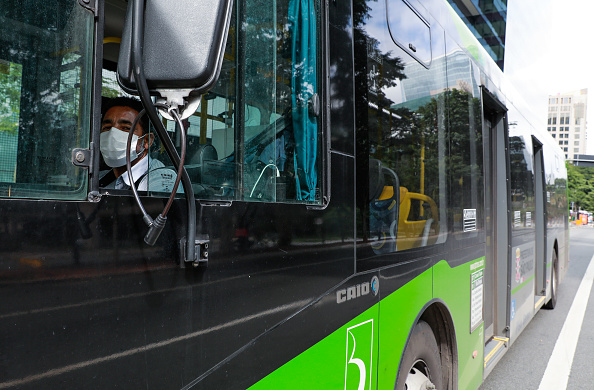
A bus driver wearing a mask in Sao Paulo, Brazil. (Photo by Rodrigo Paiva/Getty Images)
Transit workers are on the frontlines of the response to the COVID-19 pandemic. Bus and train operators, maintenance workers, crews disinfecting vehicles, and the entire transit workforce are bravely moving millions of essential workers in the United States. Without them, in New York City alone, 100,000 hospital workers and nearly 150,000 other health care professionals would not be able to get to work.
Transit agencies and government officials handling the pandemic response must ensure that proper measures are in place to protect transit workers. Without taking fast, comprehensive action to ensure transit worker safety, they will be at risk as they constantly interact and work in close quarters with riders. Despite the risk of getting sick and bringing it home to their families and neighbors, transit workers across the country are showing up to work and fulfilling their duties regardless of the fears they may have.
With personal protective equipment in short supply, all levels of government must step in and secure the respiratory masks, gloves, and other necessary materials to keep transit workers safe and prevent them from being unnecessarily exposed.
Below are safety protocols and other measures transit agencies around the U.S. and the globe are taking to protect transit workers. TransitCenter will continue to research and report on the multitude of actions necessary to protect the transit workers at the frontlines of this emergency.
Protecting transit operators on-board
Many agencies are blocking off the area behind the bus operator until the first wheel well. Both physical barriers/delineation and signage are necessary to prevent rider confusion and reduce strain on operators.
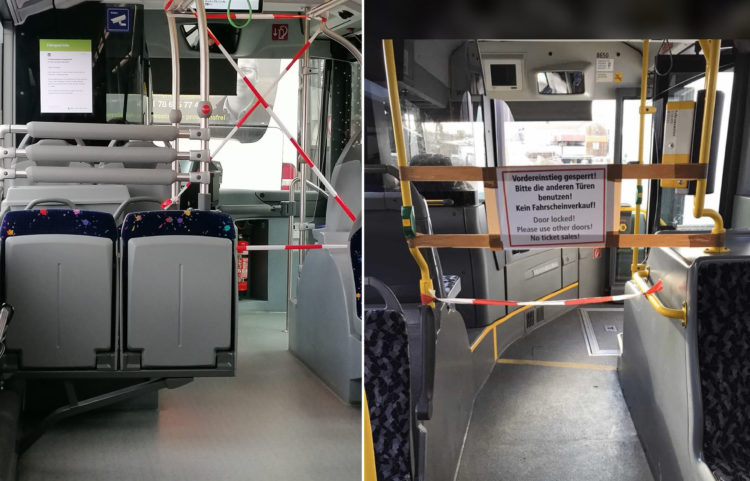
Bus partitions in Bern, Switzerland (left), and Berlin, Germany (right).
Personal protective equipment and hand sanitizer on buses
In South Korea, buses are equipped with free masks, so everyone getting on the bus is able to get a mask. Additionally, both front and rear boarding areas have hand sanitizer for passenger use.
In the U.S., there is a scarcity of personal protective equipment, even though there are many frontline workers, including transit workers, who desperately need it. While unions and local and state governments are stepping in and working with local businesses to remedy the scarcity, the federal government is the only entity with the capacity to mobilize production at the scale demanded by this emergency.
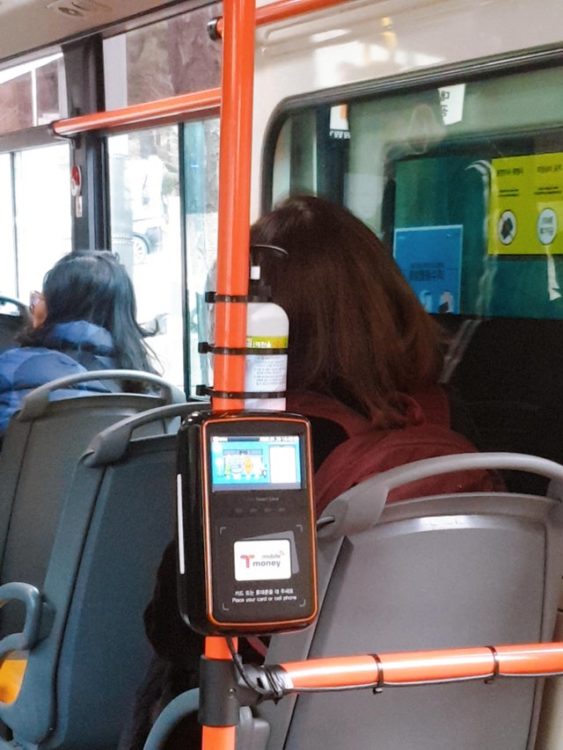
Hand sanitizer on the bus in Seoul, South Korea.
Mobile hand washing stations
To prevent the risk of COVID-19 outbreak and transmission, passengers at the Kigali Bus Park have to wash their hands before getting onto buses.
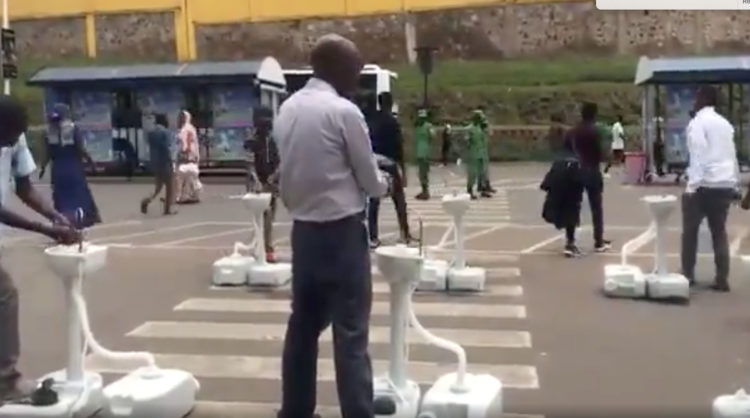
SEEN IN KIGALI: To prevent the risk of #Coronavirus outbreak, passengers at the Kigali Bus Park have to wash their hands before getting onto buses.#Rwanda has recorded NO case of the epidemic but the country has stepped up vigilance. pic.twitter.com/tb7cfUNj7K
— The New Times (Rwanda) (@NewTimesRwanda) March 9, 2020
Rotating schedules to reduce crowding in depots
Reducing crowding and promoting social distancing is one key way to prevent the spread of COVID-19 and keep transit workers safe and healthy. To help keep depots safe, many agencies have instituted rotating schedules for operators, while also ensuring their allocated number of hours. Pittsburgh’s Port Authority has also redone shifts and driver check in procedures to stagger the number of employees in the garage at any one time.
The Toronto Transit Commission has laid out gridded tape on break room floors and sign in area, delineating two-meter blocks to keep employees apart.
Disinfecting buses at the end of each run
In Palm Beach, the transit agency is thoroughly disinfecting each bus after each run, not just at the end of the day, making sure that the next operator to use it can be assured of his or her safety.
Expanding paid leave
In Pittsburgh, in order to ensure operators aren’t coming in sick and spreading the virus, the Port Authority is encouraging operators who feel sick (with any illness) to stay home. It has also issued a paid leave policy that, if ordered by a doctor, ensures full compensation during the 14-day quarantine. This paid leave policy applies to operators who need to take care of a sick spouse, child or loved one.
Ensuring operators have access to safe facilities while driving
With many businesses closing, bathrooms and other comfort facilities that operators typically rely on aren’t available. In Detroit, after drivers brought this issue to the city, the city agreed to make sure restrooms are available, purchasing portable toilets with hand sanitizers if necessary. In London, Ontario, faced with the same problem as Detroit, the transit agency appealed to grocery stores and pharmacies to step in as other businesses closed, finding 25 new locations for drivers to use facilities.
 New TransitCenter Report: To Solve Workforce Challenges Once and For All, Transit Agencies Must Put People First
New TransitCenter Report: To Solve Workforce Challenges Once and For All, Transit Agencies Must Put People First
TransitCenter’s new report, “People First” examines the current challenges facing public sector human resources that limit hiring and retention, and outlines potential solutions to rethink this critical agency function.
Read More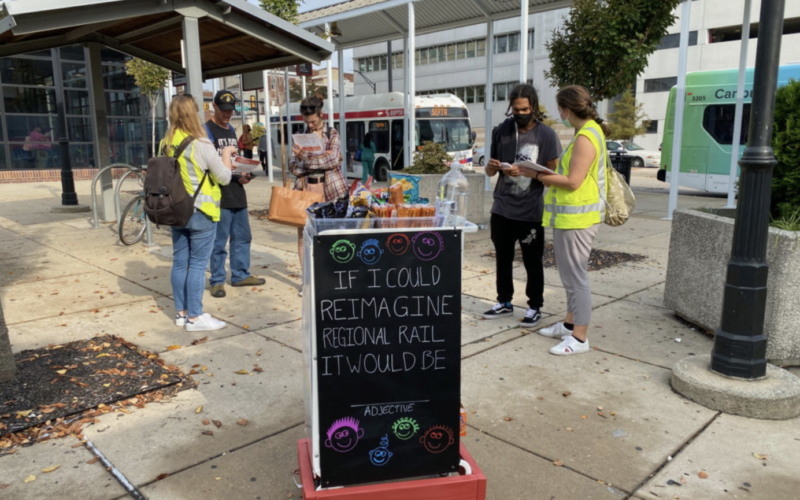 A Transit Revolution in Philadelphia?
A Transit Revolution in Philadelphia?
The Southeastern Pennsylvania Transportation Authority (SEPTA) has been working throughout the pandemic on several system-wide planning initiatives that have the potential to transform transit service in and around the city of Philadelphia.
Read More